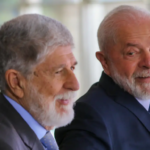
Conversation between leaders takes place under pressure from the US for an agreement that cedes territories and limits Kiev’s sovereignty
German Chancellor Friedrich Merz and United States President Donald Trump discussed peace proposals for Ukraine this Friday (21), according to German government spokesman Stefan Kornelius. The telephone conversation takes place at a time of intense pressure from the US to accept an agreement with Russia that, in practice, meets the Kremlin’s main demands and weakens Kiev’s position.
Chancellor Merz is expected to inform European partners about the content of the dialogue with Trump before heading to the G20 summit in South Africa. The intention is for European leaders to meet on the sidelines of the event, on Saturday, to define the next steps in relation to the conflict. Kornelius confirmed that Merz and Trump agreed to continue discussions within the national security advisors.
The 28-point plan: victories for Putin
The center of the discussions is a 28-point peace plan, drawn up jointly by envoys from Trump and Russian President Vladimir Putin. The proposal, negotiated by US envoy Steve Witkoff and Putin envoy Kirill Dmitriev, represents a set of concessions considered drastic by Ukraine and its Western allies.
Among the most critical terms of the proposal, obtained by Bloomberg Newsthey are:
- Territorial Assignment: Ukraine would be forced to cede large portions of territory currently occupied by Russia. Furthermore, the regions of Crimea, Luhansk and Donetsk would be “recognized as de facto Russian, including by the United States”.
- Neutrality and Disarmament: The plan requires Ukraine to renounce any hope of joining the I’LL TAKEand this promise would have to be enshrined in the Ukrainian Constitution. The country would also need to limit the size of its Armed Forces.
- Sanctions and Reinstatement: Sanctions against Moscow would be gradually lifted, and Russia would be reinstated into the G8a highly symbolic step that would end his international isolation.
- Conditionalities for Kiev: Ukraine would be obliged to hold elections within 100 dias.
Although President Volodymyr Zelenskiy has said he is looking into the idea, there is very little evidence that he is willing to accept terms that have been vehemently rejected by Kiev and its allies in the past.
Financial involvement and pressure from Washington
The peace proposal not only benefits Russia, but also provides for significant financial participation by the United States in the reconstruction of Ukraine.
- Security and profit guarantee: Ukraine would receive a US security guaranteebut Washington would be compensated for it.
- Russian assets: Nearly $100 billion in Russian assets frozen would go toward U.S.-led reconstruction efforts, with the U.S. government receiving 50% of profit. Unused assets would be allocated to a Russian-American investment fund.
The plan is supported by Trump, as stated by White House press secretary Karoline Leavitt. “I will not discuss the details of this plan as it is still in progress and subject to change, but the President supports it”she said. “It’s a good plan for both Russia and Ukraine and we believe it should be acceptable to both sides.”
However, the sheer size of the concessions demanded and the significant financial gain for the US and Russia raise serious questions about how much leeway Zelenskiy actually has to oppose the proposal. Pressure on Kiev could include the threat of US withholding weapons supplies and intelligence information.
Read also: Record unemployment among Americans with degrees reveals the price of Trump’s policies
Secretary of State Marco Rubio, who takes a tougher line on Moscow than negotiator Witkoff, said negotiators “will continue to develop a list of potential ideas to end this war, based on input from both sides of the conflict”.
The rejection of allies and the limitation of sovereignty
The response from Ukraine’s main allies was swift and negative. British Prime Minister Keir Starmer and Europe’s top diplomat Kaja Kallas echoed the same principle: any peace agreement must have the approval from Ukraine.
“Ukraine’s future must be determined by Ukraine and we must never lose sight of this principle that underpins the just and lasting peace we all desire”stated Starmer.
Although the document imposes some limitations on Russia — such as the expectation that the principle of non-aggression towards Europe be enshrined in law and the promise not to invade other countries — the balance of the proposal is overwhelmingly in favor of the Kremlin. By demanding that Ukraine cede vast territories, limit its military and abandon its NATO aspiration, the plan essentially compromises Kiev’s sovereignty and future security in exchange for an immediate end to the conflict.
With information from Bloomberg*
Source: https://www.ocafezinho.com/2025/11/22/governo-alemao-diz-que-trump-e-merz-trataram-acoes-contra-a-ucrania/

